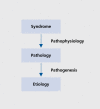Psychiatric manifestations of neurologic disease: where are we headed?
- PMID: 17726911
- PMCID: PMC2687521
- DOI: 10.31887/DCNS.2007.9.2/clyketsos
Psychiatric manifestations of neurologic disease: where are we headed?
Abstract
Neuropsychiatry represents a field of medicine situated at the crossroads of neurology and psychiatry, and deals with the interface of behavioral phenomena driven by brain dysfunction. Psychiatric symptoms are highly prevalent in these conditions, are a major source of disability and diminished quality of life, and potentially represent the target of treatment interventions that stand to significantly decrease the suffering they generate. In this article, the disease paradigm is explained, with particular attention to its role as an organizing principle for the field. Specific diseases including traumatic brain injury, stroke, Parkinson's disease, Alzheimer's disease, multiple sclerosis, and epilepsy are explored in relation to the presentation of multiple psychiatric phenotypes in each, associations with underlying brain pathology, and existing treatment approaches. Finally the article explores the inherent complexities in this area of research and proposes a framework for future work based on the understanding of phenomenology and associated risk factors, the involvement of the rapidly advancing field of neuroscience, and targeted treatment development to serve as a road map for advancement in the field..
La neuropsiquiatría representa un campo de la medicina ubicado en el cruce (crossroads) de la neurología y la psiquiatría, y aborda la interfaz de los fenómenos conductuales provocados por disfunción cerebral. Los síntomas psiquiátricos en estas condiciones son altamente prevalentes, son una fuente importante de incapacidad y disminuyen la calidad de vida, y potencialmente representan el blanco para intervenciones terapéuticas que se mantienen para reducir significativamente el sufrimiento que ellos generan. En este artículo se explica el paradigma de enfermedad, con especial atención a su papel como un principio organizador para este campo. Se exploran enfermedades especificas como el daño cerebral traumático, accidentes vasculares, Enfermedad de Parkinson, Enfermedad de Alzheimer, esclerosis múltiple y epilepsia en relación con la presentación de fenotipos psiquiátricos múltiples en cada una, asociaciones con la patología cerebral subyacente y las aproximaciones terapéuticas existentes. Finalmente el articulo explora las complejidades inherentes a esta área de investigación y propone una estructura para el trabajo futuro basada en la comprensión de la fenomenología y los factores de riesgo asociados, el compromiso del campo de las neurociencias de rápido avance y el desarrollo de tratamientos específicos que sirvan como un mapa de ruta para el avance en esta área.
La neuropsychiatrie est une spécialité médicale située au carrefour de la neurologie et de la psychiatrie, et traite de l'interface des troubles du comportement provoqués par des troubles cérébraux. Les symptômes psychiatriques sont très répandus dans ces maladies ; ils sont la principale cause d'incapacité, diminuent la qualité de vie et sont la cible potentielle de traitements qui visent à diminuer significativement la souffrance qu'ils génèrent. Cet article présente le paradigme de la maladie en insistant sur son rôle en tant que principe organisateur. Des maladies spécifiques comme les lésions cérébrales traumatiques, les accidents vasculaires cérébraux, la maladie de Parkinson, la maladie d'Alzheimer, la sclérose en plaques et l'épilepsie sont examinées en fonction de la manifestation des nombreux symptômes psychiatriques pour chacune, des associations avec une pathologie cérébrale sous-jacente et des approches thérapeutiques existantes. Enfin, l'article envisage les difficultés inhérentes à ce champ de recherche et propose un cadre de travail basé sur la compréhension de la phénoménologie et des facteurs de risque associés, la participation des neurosciences, qui progressent rapidement, et le développement de traitements ciblés comme ligne directrice pour avancer dans ce domaine.
References
-
- Lyketsos CG. Lessons from neuropsychiatry. J Neuropsychiatry Clin Neurosci. 2006;18:445–449. - PubMed
-
- McHugh PR., Slavney PR. The Concept of Diseases. In: McHugh PR, Slavney PR. The Perspectives of Psychiatry. 2nd ed. Baltimore, MD: The Johns Hopkins University Press; 1998:45–98.
-
- Jeste DV., Friedman JH. Psychiatry for Neurologists. Totowa NJ: Humana Press; 2005
-
- Lyketsos CG., Rabins PV., Lipsey JR., Slavney PR. eds. Psychiatric Aspects of Neurologic Diseases: Practical Approaches to Patient Care. New York, NY: Oxford University Press. In press.
-
- Rao V. Psychiatric aspects of traumatic brain injury. In: Lyketsos CG, Rabins PV, Lipsey JR, Slavney PR, eds. Psychiatric Aspects of Neurologic Disease: Practical Approaches to Patient Care. New York, NY: Oxford University Press. In press.
Publication types
MeSH terms
Substances
Grants and funding
LinkOut - more resources
Full Text Sources
Medical

